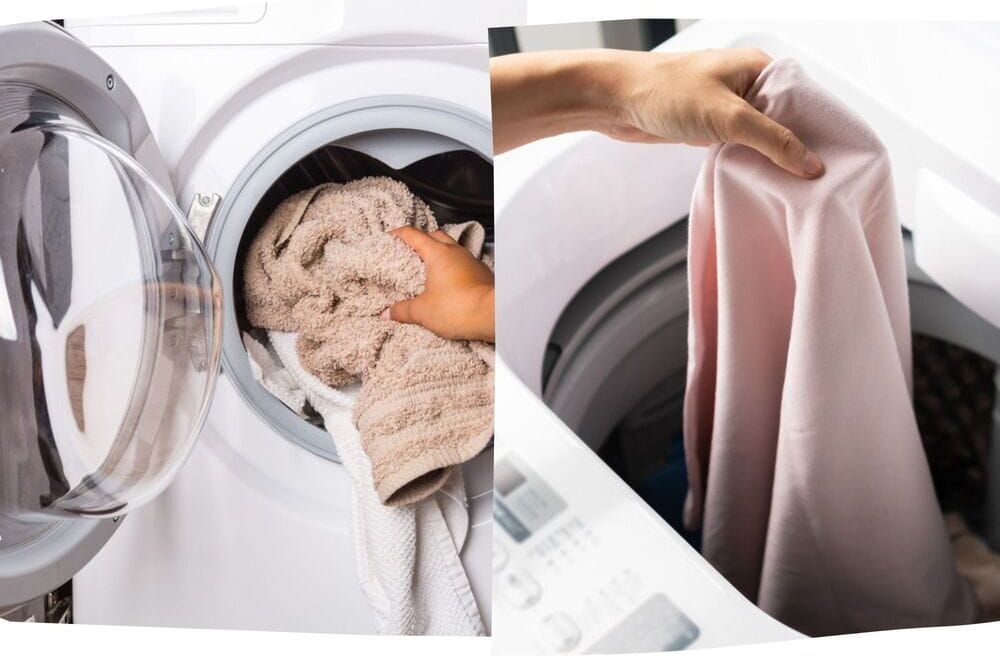It’s Sunday morning, and your laundry basket is overflowing.
Are you zipping through the task with a smile or grumbling over a washing machine that’s not quite cutting it?
Your washing machine impacts your energy bills and your clothes’ lifespan.
But with so many options out there, your head can feel like it’s on a spin cycle trying to decide!
Should you go for a front load or a top load washer?
In this article, we’ll talk about the differences between a front loader and a top loader washing machine.
Let’s see which one fits your needs!
How They Work | Ease of Use | Wash Cycles | Cleaning Power | Energy and Water Use | Capacity | Floor Space | Maintenance | Cost | Which Is Better?
Front Loader vs Top Loader Washing Machines: A Quick Comparison

Front loader washing machines open from the front with a door that swings outward and to the side.
Meanwhile, top loader washing machines open from the top so you can simply load them from above.
Trying to pick between the two?
Here’s a quick comparison between front loader and top loader washing machines:
| Features | Front Load Washing Machines | Top Load Washing Machines |
| How They Work | Horizontal drum spins and tumbles clothes using gravity | Vertical drum uses an agitator or impeller to tumble clothes |
| Ease of Use | Need to bend to load and unload; no need to lift clothes in and out | No need to bend to load and unload; need to lift clothes in and out |
| Wash Cycles | Gentler but longer wash cycles | Quick cycles perfect for everyday laundry |
| Cleaning Power | Top-notch for tough stains | Effective but can be less precise |
| Energy and Water Use | Energy and water savers | Use more energy and water |
| Capacity | Generally offer more space | Agitators reduce space, but impeller models are roomier |
| Floor Space | Stackable with dryers, ideal for tight spaces | Not stackable, need more room |
| Maintenance | Need more care due to their rubber gaskets | Generally easier to clean |
| Cost | Pricier upfront but save on utility bills | Lower initial price but may cost more over time |
Front Load vs Top Load Washers: A Detailed Breakdown
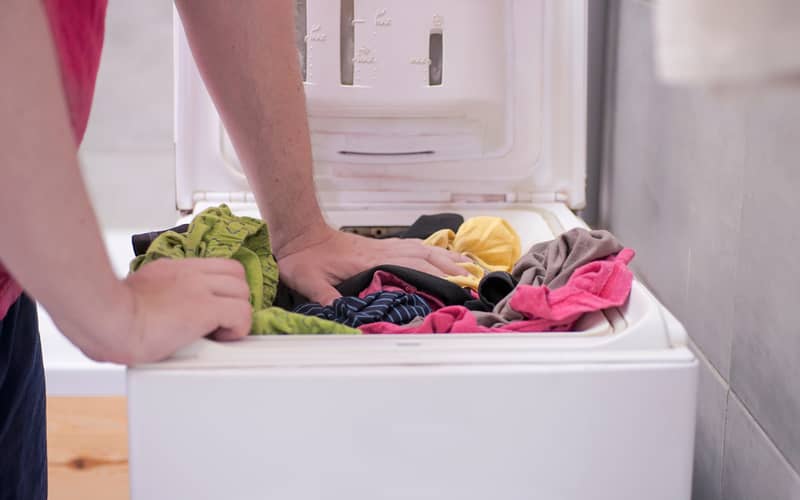
Can’t decide if you’re team front loader or team top loader?
Let’s talk about the major differences between front load and top load washers in more detail!
How they work
Front loader washing machines spin a horizontal drum.
As the drum turns, clothes are tumbled inside and gravity helps the clothes drop and move around.
This creates friction that gently cleans the clothes.
Meanwhile, top loader washing machines have a vertical drum with either an agitator or an impeller.
An agitator is a tall spindle in the drum’s centre that twists back and forth to scrub clothes.
It can be rough on fabrics and is more common in older top-load washer models.
Meanwhile, an impeller is a low-profile disk at the bottom of the drum that spins clothes gently.
It’s more common in newer, high-efficiency (HE) top load washers.
Ease of use
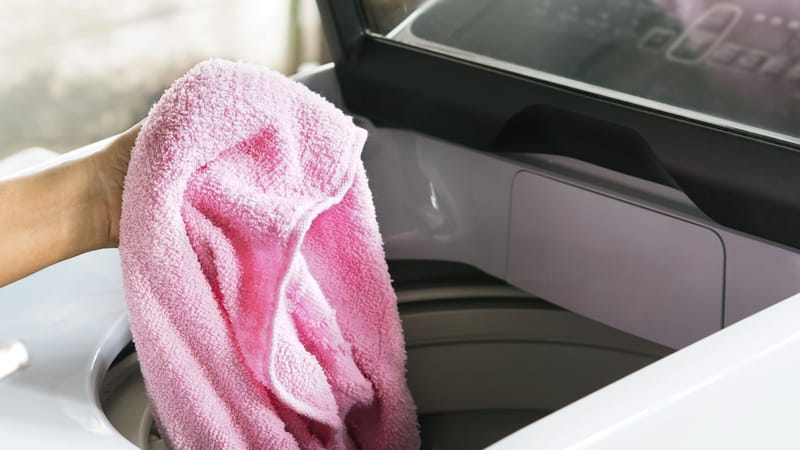
When it comes to ease of use, both front and top loaders have their pros and cons.
With a top load washer, you don’t need to bend to load and unload it.
You can just drop your clothes in from the top, but lifting heavy items like bed sheets in and out of the drum can be a hassle.
However, top loaders let you toss in forgotten items mid-cycle — something not all front loaders allow.
On the other hand, you have to bend or crouch to load and unload a front load washer.
The upside? No heavy lifting when taking clothes out!
You can also place a front load washer on a stand for better access.
Wash cycles
Front loader washing machines are gentler on clothes and great for delicates but may have a longer wash time.
They also have more advanced features like steam cleaning, Wi-Fi connectivity, and a range of wash cycles.
On the other hand, top loaders wash clothes faster.
And while they have fewer advanced features, they cover all the basics and are user-friendly.
This makes them perfect for everyday laundry, but the agitator can be rougher on fabrics.
Agitators twist and tumble clothes aggressively, which can stretch and distort fabrics. The fins can also snag clothing, leading to pulls or runs.
If you love the speed of top loaders but worry about your clothes, look for impeller models.
They’re usually gentler on clothes than agitator models.
Cleaning power
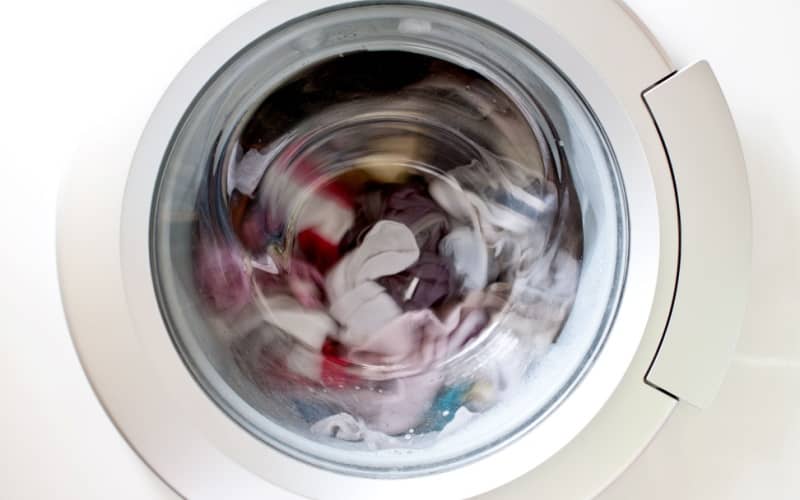
Front loader washing machines take the lead in cleaning power — perfect for heavily soiled clothes!
Their tumbling motion puts gravity to work. Clothes are knocked against each other and the drum for a deeper wash.
Front loaders also spread water and detergent more evenly.
Top loader washing machines still clean well, but they rely more on detergent and hot water instead of movement.
They can also clump and tangle clothes, which can lead to uneven cleaning. You may find missed stains and other dirty spots.
Energy and water efficiency
If you’re eco-conscious and want to save on bills (who doesn’t?), a front loader might be your best mate!
Front loaders are more water-efficient and use less detergent than top loaders.
Front loaders don’t need to be filled up with water to wash. As the drum spins, it drags clothes through a shallow pool of water.
Meanwhile, top loaders need higher water levels, especially for large laundry loads.
Front loaders also win at energy efficiency. Their higher spin speeds squeeze out extra moisture from clothes.
This cuts down dryer time — and your power bill!
Capacity
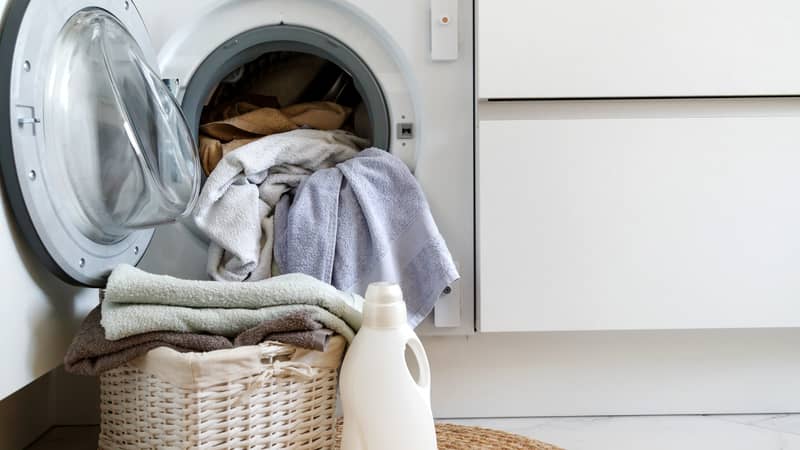
Both front and top loader washing machines come in large-capacity models, but the actual drum space varies.
Agitators in top load washers occupy more space inside the drum, which leaves less room for your laundry.
On the other hand, front loaders use the entire drum space for laundry, which allows for larger loads.
If you want a top loader with more space, look for impeller models instead.
These use a low-profile disk instead of a bulky agitator so you’ll have more room for your laundry.
Floor space

If saving space in your laundry room is a priority, front loaders are the clear winner!
They’re stackable — you can place the dryer on top of the washer to free up room.
However, your clothes dryer and washer might need to match, since stacking kits are often made for specific sizes and mounting points.
Front load washers are also great for European laundries because they’re more compact.
You can fit them in small bathrooms, kitchenettes, or even under the counter.
On the other hand, top loader machines aren’t stackable, so they’ll take up more floor space.
Maintenance
It’s generally easier to clean a top loader washing machine than a front loader!
Top loaders are less likely to get mouldy because they don’t have a rubber seal.
Their open top also makes everything easier to reach and clean.
Meanwhile, front loaders need a bit more attention.
Their rubber seals are prone to mould, which can lead to a smelly washing machine.
However, wiping the drum and seal after each cycle or leaving the door open to dry can help you avoid this.
Cost
If you’re on a budget right now, a top loader might be the way to go since it’s cheaper upfront.
However, you might pay more for water and electricity over the machine’s lifespan.
Front loaders, meanwhile, are generally pricier.
But they can save you money in the long run because they’re more water and energy-efficient.
Front Loader vs Top Loader Washing Machines: Which Is Better?
When picking a new washing machine, there’s no one-size-fits-all answer. It all depends on your needs.
Consider the washer’s size and capacity, your laundry habits, and the initial and long-term costs.
Check out the pros and cons of front and top load washers below!
Pros and cons of front load washers
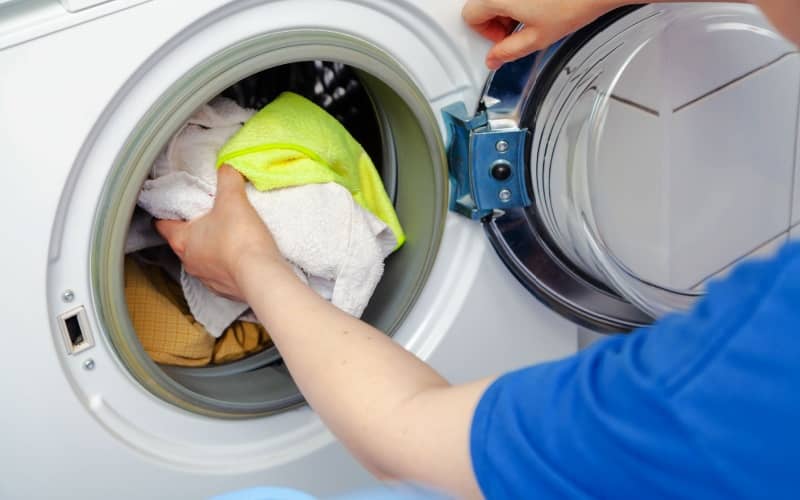
Go for a front load washer if you’re looking for long-term savings and powerful cleaning.
It’s initially more expensive, but the eco-friendly features and gentle cleaning action make up for it.
Pros
- Gentler with clothes
- Superior cleaning power
- Energy and water saving
- No need to lift items in and out
- Space-saving, stackable with dryers
Cons
- Higher upfront cost
- Need to bend to load
- Prone to mould and smells
- Harder to add clothes mid-cycle
Pros and cons of top load washers
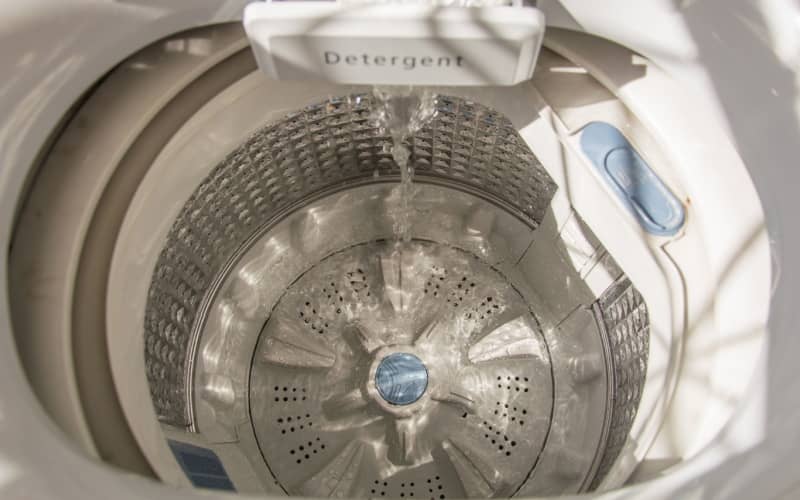
Pick a top load washer if you’re looking for a budget-friendly option that’s easier to use and clean.
It’s also great for quick everyday loads, but you may need to pay more for utility fees over time.
Pros
- Cheaper upfront
- Faster wash cycles
- Easy to load from above
- Easier to clean and maintain
- Let you add clothes mid-cycle
Cons
- Less efficient cleaning
- Take up more floor space
- Need to lift items in and out
- Generally harsher on clothes
- Higher energy and water bills
FAQs: Front Loader vs Top Loader Washing Machines

Still have some concerns? Learn more about front loader and top loader washing machines below!
What lasts longer, front loader or top loader?
When it comes to lifespan, top loaders win!
You can expect top loaders to last up to 15 years, while front loaders last about 11 years on average.
Top loaders are also cheaper to repair than front loaders because they have fewer and simpler wash features.
Which is quieter, front loader or top loader?
Front loaders are usually quieter because they shake less.
Top loaders — especially agitator models — can be pretty noisy when they spin.
Impeller top loaders are a bit quieter but still not as quiet as front loaders.
If you don’t like noise, pick a front loader and place it on a sturdy, even floor.
Why would you want a front load washer?
You’d want a front load washer if you’re looking for superior cleaning power and energy efficiency.
It’s also gentler on clothes, uses less water and detergent, and is stackable with dryers — great for tight spaces!
Why would you want a top load washer?

You’d want a top load washer if you’re after convenience and speed.
It washes clothes more quickly, lets you add items mid-cycle, and is cheaper upfront.
If you go for high-efficiency models (impeller) instead of agitator models, you’ll get more space for your laundry load!
What is the biggest problem with front load washers?
The biggest problem with front load washers is mould and mildew build-up.
Moisture can get trapped in the rubber door seal and cause bad smells.
To keep your front loader washing machine clean, it’s important to:
- Wipe the seal dry after each use.
- Leave the door slightly open between cycles to let the inside dry.
- Deep clean the drum and rubber seal monthly using bicarb soda or vinegar.
What is the biggest problem with top load washers?
The biggest problem with top load washers is their potential wear and tear on clothes.
This is especially a concern for agitator models, which use a central spindle to twist and turn clothes.
This aggressive motion can tangle and stretch clothing and wear out your garments faster.
If you’re set on top load washers but fabric care is a concern, consider high-efficiency top loaders.
They use low-profile disks called impellers, which are gentler on clothes.

